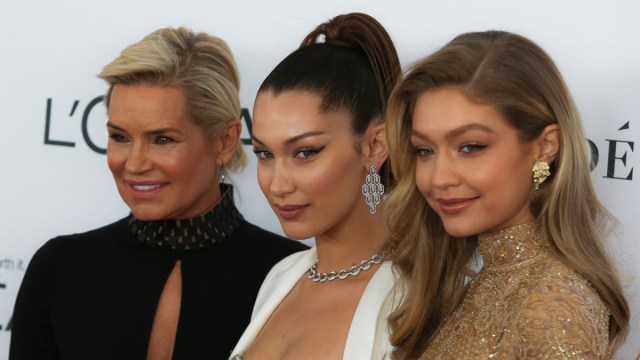The term “Almond Mom” comes from a controversial comment one reality star made to her child
If you’re a fan of the Bravo Real Housewives franchise, you’re probably familiar with Yolanda Hadid—and how serious she was about making sure her daughters, Gigi Hadid and Bella Hadid, would follow in her supermodel footsteps. The show followed Hadid as her daughters, both teenagers at the time, were starting to branch into the world of modeling. Yolanda’s behavior toward Gigi was questionable at best, ingraining hard-core body issues at worst, as she was repeatedly shown pressuring Gigi to diet and think about the way her body appeared, and consistently judging her daughter for the choices she made.
Years after Yolanda left the series, her problematic parenting has come into view thanks to a viral TikTok that highlights some of her worst moments. In it, Gigi calls her mom, not feeling well because all she’d had to eat was half an almond. “I’m feeling really weak,” she tells her mother, with a shaky-sounding voice. “I had, like, half an almond.”
Yolanda’s response? “Have a couple of almonds, and chew them really well.”
The compilation highlights an undercurrent that Yolanda repeatedly pressured Gigi to think about her body before all else. Whenever Gigi talked about food, her mom appeared visibly uncomfortable, equating enjoying it to being “bad.” “You can have one night of being bad, right,” Yolanda says in the clip. “Then you gotta get back on your diet, though. Because, you know, in Paris and Milan they like the girls just a tad on the skinny side.” She wouldn’t even let Gigi enjoy a full bite of cake to celebrate her birthday. She instead took half of it herself, whittling it down to a morsel before she offered it to Gigi.
Today Parents talked to Dr. Karla Lester, a pediatrician and child obesity expert, about the term. ”The almond mom phenomenon is rooted in fatphobia and internalized bias,” Lester told TODAY Parents. “She projects her own fears onto her children and in doing so, teaches them that she doesn’t accept them unless they’re at a weight that may be unattainable.”
Some people would say her behavior toward her daughters “worked.” She raised two supermodels. But at what cost?
I’m in my forties, and most women my age grew up with mothers obsessed with diet culture. The “diet culture” of the ’70s, ’80s, and ’90s was much different from the diet culture of today. There are definitely arguments that they’re both equally as damaging, but at least today’s culture tries to pretend it’s rooted in “health.” When we were kids, it wasn’t centered around healthy habits, movement for joy, or intuitive eating in any way. It was a much more Yolanda Hadid approach to food: it’s bad, it needs to be avoided, and being fat is the biggest failure you could possibly endure.
I lived with an almond mom and battled a three-decade eating disorder. It’s something she’s still never acknowledged, even though I’ve attempted to talk to her about her problematic behavior, mostly because I don’t want to see it repeated around her grandchildren. No matter, she can’t help herself but talk about their bodies, saying things like my daughter “will have a beautiful body” when she grows up, continuously emphasizing that her legs are “long and lean like her dad’s,” and saying she can “eat whatever she wants and still be thin.” This avoidance of my mother’s is echoed in the way Yolanda herself is handling the backlash from the viral reel. She took to Instagram to poke fun at it:
@ ♬ –
What I’ve learned in my own struggle for recovery is that the most impactful thing we can do is break the cycle. I don’t talk about my children’s bodies—in positive or negative terms. We don’t call foods “bad” or “good.” We reinforce the idea that all bodies are good bodies and deserving of respect. I’m not a perfect mom, but I’ll never be an almond mom.











